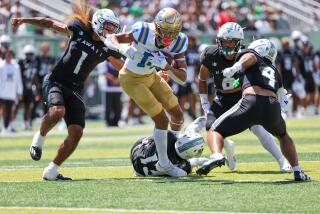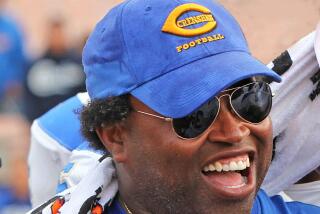Scott won’t live with regrets
- Share via
Eric Scott says it’s really not that big of a deal. How could it be, considering what else he has endured?
Three of his older brothers are dead. He was once stabbed in the chest. And his football players at Compton Centennial High live with the threat of gang violence every day.
So Scott isn’t about to wallow in self-pity just because he is no longer the wide receivers coach at UCLA, and instead is guiding an 0-1 high school team.
“When you’ve seen the things I’ve seen . . . how can I let something like that or even the what-if game change me?” Scott says.
From 2006 to 2008, Scott, a former receiver at Los Angeles Crenshaw and UCLA, helped the Bruins secure some of their top Southland recruits.
But some questions about his background came to light after he was arrested on suspicion of residential burglary in July 2007. It was then that UCLA athletic officials learned Scott had twice been sentenced for illegally carrying a concealed weapon and also had been cited for disturbing the peace.
Scott kept his job after the Los Angeles County district attorney’s office declined to file charges in connection with the alleged burglary. But he was out after Rick Neuheisel replaced Karl Dorrell as head coach.
“I just had some guys that I had in mind, especially when I was able to secure Coach [Norm] Chow,” Neuheisel says. “But I thought long and hard about Eric. I think he’s a bright young coach and I think he’ll be back in the college game in no time at all -- and I wouldn’t be surprised if it were right here.”
In his first extensive comments about his legal scrapes, Scott explained his side of the circumstances surrounding each incident.
He said his 2007 arrest came after he drove two of his former Crenshaw players -- he was an assistant at his alma mater before being hired by UCLA -- to Norwalk so that one could pick up a DVD player from a cousin. While Scott was sitting outside in his car, police descended upon the residence from both sides. Deputies later found rifles, shotguns and a large quantity of marijuana inside the home.
“Logically, it makes no sense to burglarize a place at 11 o’clock in the morning with UCLA gear on, driving a brand-new Mercedes,” Scott says.
As for the gun charges he faced in 1996 and 2004, Scott said neither weapon was his.
Scott conceded that during a traffic stop in Culver City in 2002 he resisted when officers attempted to pin his arms behind his back in a manner that was painful. A charge of unlawful obstruction of a police officer was later reduced to misdemeanor disturbing the peace.
Scott, 34, doesn’t hide his background from his players at Centennial, where he took over as coach in August of last year. “I definitely share every experience I’ve had,” he says. “I’ll tell them, ‘Google my name.’ ”
For the most part, they would find an unlikely success story. Reared in a gang-infested area of Los Angeles, Scott maintained a 3.9 grade-point average in high school while blossoming into a standout football player.
He was recruited by Yale and Harvard but settled on Northwestern after his mother pleaded with him to experience life outside of Southern California. He transferred to UCLA after his freshman year.
Thanks to his mother, Scott avoided the gang culture that ensnared his siblings and resulted in the shooting deaths of three older brothers. One was gunned down in a liquor store parking lot while going to buy ice cream for his son.
Scott, who was reared by a single parent, says his brothers “were my father figures. To see them killed one at a time, it’s a horrible thing.”
Scott said he tries to be a father, a brother and a friend to his players at Centennial, many of whom are confronted with challenges similar to those he faced as a teenager. He has given each player his cellphone number and told them to call any time, regardless of how trivial the matter might be.
“You can call him if you’re [running] late to practice or you need to go over your SAT scores or anything,” senior quarterback Nelson Gammage says. “He’s always there for us.”
Of course, that might no longer be the case if Scott gets another chance in college.
But if this is it, and Scott’s legacy is nothing more than a cautionary tale for his players, he would have no regrets.
“Everything that I have done definitely has made me stronger and a new person to understand the whole concept of living and survival,” he says. “It’s changed my life as far as becoming a better survivor. If it takes for me to be a living example for these kids, I don’t have a problem with that.”
--
More to Read
Go beyond the scoreboard
Get the latest on L.A.'s teams in the daily Sports Report newsletter.
You may occasionally receive promotional content from the Los Angeles Times.







